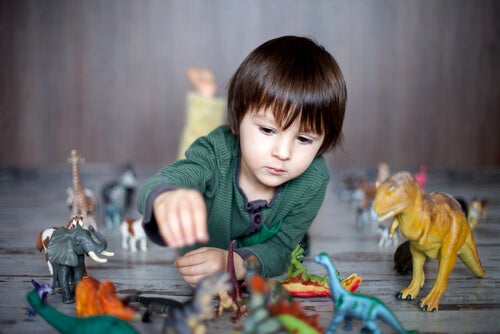How to Detect High Intellectual Giftedness


Written and verified by the psychologist Valeria Sabater
The way high intellectual giftedness is detected usually varies. Some people reach adulthood without even knowing their special abilities.
Likewise, we must also bear in mind that nearly 70% of these children, far from being identified as of high ability, are actually victims of school failure. Sadly, their capacities, talent, and potential go completely unnoticed.
This is undoubtedly a complex issue. In fact, it’s very common to meet adults who’ve spent much of their lives not knowing what was ‘wrong’ with them.
We use the term “wrong” because that’s what many people felt about themselves after experiencing problems in school, difficulties in their social relationships, or great disappointments in a work world that didn’t fit well with their interests or expectations.
Early detection of intellectual giftedness is key in all cases. However, it’s important to bear something in mind, as Alicia Rodriguez, president of the Spanish Association for the Gifted and Talented (AEST) points out.
She says that, even though many parents can sense above-normal abilities in their babies when it comes to speaking or developing fine motor skills, among others, it’s best to wait until the children are three or four years old.
Likewise, it’s also good to clarify one particular aspect. It isn’t correct to identify high capacities simply through a high IQ. It isn’t enough to just apply a test. In fact, these tests are often not even conclusive, for reasons that we’ll see below. In reality, professionals take note of many other variables, aspects that undoubtedly define these children’s emotional and personal complexities.
“How is it that so many intelligent children often become stupid adults? It must be the result of education.”
-Alejandro Dumas-

How to detect high intellectual giftedness
The most common way to detect high intellectual giftedness is through the family. It’s the parents who, as a rule, detect the first signs. They notice that their children show an unusual curiosity for their age. Their insightful comments or the particular interests they have are always a good indicator.
However, this doesn’t happen in all cases. Many children reach school age and suddenly find themselves in a context that, far from encouraging their potential, actually stifles it. Moreover, a recurring problem that many of these children show is hyperactive behavior.
As revealed in a study conducted at State University of New York Upstate Medical University (SUNY Upstate or Upstate) in New York, this is something that psychologists and neurologists must take into account. Hyperactivity is often due, to a large extent, to feeling restless and wanting to experience, touch, see, discover, feel, comment, and feel challenged. This type of behavior doesn’t sit well in most school classrooms.
How we can detect high intellectual capacities?
Aspects that families should observe
We pointed this out earlier. The first filter to detect high intellectual giftedness is the family environment. Therefore, we recommend that parents take the following factors into account.
- The child learned to read at an early age.
- They want to know how everything works.
- They like to talk to older people.
- It’s common for them to ask very reflexive and existential questions.
- They make judgments quickly.
- They’re concerned about social issues.
- A dislike for routine tasks and they get bored easily.
- They like to play alone.
- Changing hobbies frequently (one day they want to paint, the next day they’re looking for some astronomy books).

Conditions to identify a child with high intellectual giftedness
At the beginning of the article, we mentioned intelligence and IQ tests. If we only classified children with an IQ of 130 or above as gifted, then we wouldn’t identify very many. Not all children or adults respond well to this type of structured test. We need more sources of information to complement the tests. Here are some of them:
- Family information. We need to know about the child’s development and the questions cited above are important in this.
- Academic and teacher information. Experts won’t only evaluate using class grades, but will also address the students’ behavior in class.
- An interview with the child. At this point, numerous factors are addressed:
- Social interests.
- Hobbies.
- Aspirations.
The most common psychometric tests
In this case, we use the tools that correspond to the child’s age:
- WISC (give to 16 years)
- WAIS (from 16 to 65 years old)
- McCarthy Scales of Children’s Abilities (MSCA) for children aged two to eight.
- Raven’s Progressive Matrices Test.

What to do once high intellectual capacities are detected in a child?
Once high intellectual giftedness is detected in a child comes the most important step. In order to capture their attention, we need to give them a specific and suitable solution.
However, we must take into account that they aren’t only students with special educational needs. They’re people who also need other support, and there are many more factors to help them enjoy an optimal and happy development – one in which they can reach their whole potential.
For this reason, teachers, professors, and families must pay attention to certain factors that Patricia Veerharen explains in her book Educación de Alumnos Superdotados (In English: Education for Highly Gifted Students).
- Personal needs. Children with high abilities demand dynamic and stimulating environments.
- Academic factors. These students benefit from flexibility. It’s good for them to be able to plan their tasks and have an active role in their learning as far as possible.
- Social factors. Likewise, you need to attend to the emotional side of their life. They often feel they don’t really connect, or know how to connect, with children their age. This is something that they’ll really need to work on, thus improving their social skills.
To conclude, something that we must avoid, either as educators, psychologists, or parents, is for these children to feel that they’re a failure at school and feel dissatisfied there.
The combination of boredom and the progressive disconnection from this unstimulating environment often leads to isolation. We need to understand their needs and apply measures to prevent this from happening at all costs.
All cited sources were thoroughly reviewed by our team to ensure their quality, reliability, currency, and validity. The bibliography of this article was considered reliable and of academic or scientific accuracy.
- CLEWETT, E. C. (1984). IDENTIFICATION OF INTELLECTUAL GIFTEDNESS DURING THE PRESCHOOL YEARS. ProQuest Dissertations and Theses. University of Oregon
- DAĞLIOĞLU, H. E., ÇALIŞANDEMR, F., Alemdar, M., & KANGAL, S. B. (2010). Examination of Human Figure Drawings by Gifted and Normally Developed Children at Preschool Period. Elementary Education Online, 9(1), 31–43. Retrieved from http://ilkogretim-online.org.tr/vol9say1/v9s1m4.pdf?origin=publication_detail
- Wechsler, D. (2002). WAIS – III. Escala de inteligencia para adultos de Wechsler, 3º edición. Buenos Aires: Paidós.
- Raven, J.; Raven, J.C.y Court J.H. (1993). Test de Matrices Progresivas. Manual. Buenos Aires: Paidós
- McCarthy, D. (1996). MSCA. Escalas McCarthy de Aptitudes y Psicomotricidad para niños. Madrid: TEA.
This text is provided for informational purposes only and does not replace consultation with a professional. If in doubt, consult your specialist.








